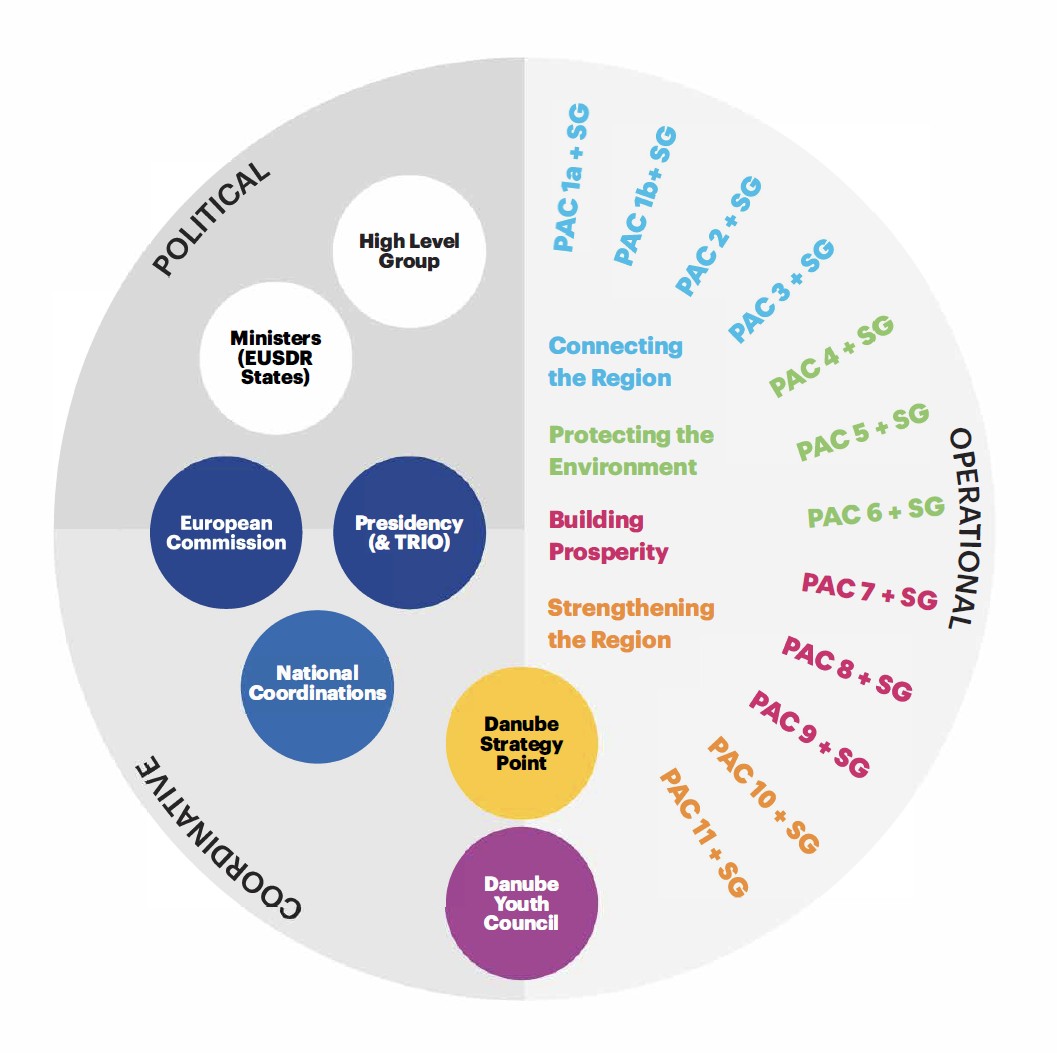Learn more about the roles and responsibilities of the main actors of the Strategy also in the EUSDR Governance Architecture Paper, officially endorsed by National Coordinators in July 2020, updated in November 2023.
The European Commission, as the executive of the EU, prepared the Strategy in 2010 in consultation with all partner countries. The Commission´s Directorate General for Regional Policy helps to implement the Strategy by facilitating and supporting actions of the participating countries. They also coordinate the Strategy at the policy level, assisted by a High Level Group.
The High Level Group (HLG) on macro-regional strategies is made up of official representatives from all EU Member States. It assists the Commission in the policy coordination of the Strategy. The Commission consults the HLG for modifications to the Strategy and the action plan, as well as for reports and monitoring. The HLG also addresses policy orientation and prioritisation.
Each Priority Area is jointly coordinated by two participating countries (or regions), who work in consultation with the Commission, relevant EU agencies and regional bodies. For each Priority Area, each of the two responsible countries designates a Priority Area Coordinator.
The Priority Area Coordinators (PACs) are leading the Steering Groups, which are the expert drivers of a day-to-day implementation. The Steering Groups, with members from all involved countries, are established for all priority areas. Their role, capacities, resources and engagement is key to success. The PACs, together with the Steering Groups, ensure the implementation of the EUSDR (e.g. by agreeing on planning, with targets, indicators and timetables, and by ensuring wide contacts between project promoters, programmes and funding sources, and by providing technical assistance and advice). Their work is trans-national, inter-sectorial and inter-institutional. PACs and Steering Groups also support the reporting and evaluation of the EUSDR – they identify progress related to the improvements that the actions and projects deliver and achievement of targets. They also regularly provide information/reports on their work.
You can find the list of PACs along with their contact information on the Contact PACs page.
The National Coordinators (NCs) are the core strategic body within the governance structure. They have a strategic coordination function within their national or regional government. The NCs coordinate and keep an overview of the participation of their country in the implementation of the EUSDR including all 12 Priority Areas (PAs). They also promote the EUSDR and inform at the national and regional level all the relevant stakeholders of key developments, ongoing initiatives, including alignment of policies and funding. NCs meetings are chaired by the country holding the rotating Presidency, which also prepares and organises them with the support of the EUSDR Trio Presidency, the European Commission (EC) and the Danube Strategy Point (DSP).
NCs are actively involved in the DRP Monitoring Committee’s discussions/decisions. The involvement takes place in one of the following ways: as a full member of the DRP Monitoring Committee (MC), an observer, a member of a national delegation or through involvement of national committees or other formal/informal joint procedures prior to the MC meetings.
You can find the list of NCs along with their contact information on the Contact NCs page.
The Danube Strategy Point (DSP) has been established in 2015 to improve the implementation process of the Strategy, supporting the Commission in its coordination tasks of the EUSDR. The DSP is supporting exchange among Priority Area Coordinators and National Coordinators in their tasks and promotes the Strategy predominantly at the European level. The DSP functioning until 2017 administered funds originating from the EU institutions in the framework of Technical Assistance for the Priority Areas in the EUSDR for the years 2015-2016. The DSP operates in two offices (Vienna and Bucharest).
You can find the contact details of all DSP staff members on the Contact DSP page.
Starting September 2018, the success story of EUSDR continues with the DSP 2, established for a 3 year period and later extended to a fourth year, through a Danube Transnational Programme’s project. Its role is to increase internal and external communication, to support EUSDR stakeholders whenever needed, in cooperation with funding instruments, and to build capacities for PACs’ specific needs and/or for EUSDR in non-EU countries wherever needed. The secretariat has also to encourage collaboration between stakeholders of EUSDR and ensure the sound monitoring and evaluation of the EUSDR.
Starting January 2023, the DSP 3 project continues the DSP’s tasks as a support unit for the whole Strategy, funded by the Danube Region Programme for a duration of 6 years.
Download the EUSDR Governance Architecture Paper here:



